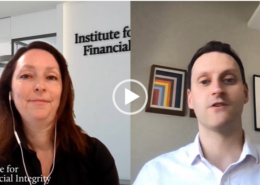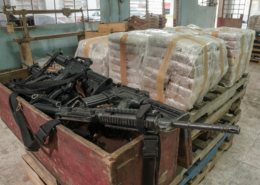FinCEN Issues Warning to Financial Institutions
Be Vigilant in Tracking Iran’s Terrorist Financing
📅 June 11, 2024
📅 June 11, 2024
The Middle East recently has seen a marked increase in terrorist activity, with Iran-backed Huthis launching attacks against shipping in the region and Iran’s proxies targeting bases in the region that house, among others, U.S. military forces. Iran, after helping plan Hamas’s attack on Israel in October 2023, according to media reports, devoted the Islamic Revolutionary Guard Corps’ (IRGC’s) foreign resources to coordinating, financing, and arming proxy militias against Israel. Groups receiving support from Tehran include designated foreign terrorist organizations such as Hamas and Hizballah.
Iran has been officially designated as a state sponsor of terrorism by the United States since 1984, so its support for terrorist militias is not new. This continued support to groups such as Hamas enabled the terrorist group to launch its attack against Israel in October, according to the Atlantic Council.
The U.S. State Department in 2019 estimated that Tehran in the past has spent as much as $700 million annually to support Hizballah and $100 million per year to support other terrorist groups, and in 2020 it assessed that Iran continued to provide support to terrorist organizations despite sanctions that were reimposed on Iran in 2018 after the United States pulled out of the nuclear deal with Iran.
The Organized Crime and Corruption Reporting Project (OCCRP) in 2021 reported that major global banks helped Turkish-Iranian money launderer Reza Zarrab move the Iranian regime’s oil money around the world, evading sanctions. Zarrab was arrested in 2016 for, among other things, working with Türkiye’s Halkbank to move and launder Iranian oil funds using front companies, with some of the money moving through U.S. financial institutions.
OCCRP assessed that between 2007 and 2015 some of the biggest and most sophisticated financial institutions in the world––Deutsche Bank, Bank of America, JP Morgan Chase, Citibank, HSBC, Standard Chartered, UBS, and Wells Fargo––processed at least $6.5 billion in transactions for companies linked to Zarrab.
Prosecutors assert that these banks are “victims,” that were deceived by Zarrab and Halkbank, which in 2019 was charged with using money servicers and front companies in Iran, Türkiye, and the UAE to help Iran transfer $20 billion in restricted funds, convert oil revenue into gold, and cash the proceeds out on behalf of Iranian interests.
These major banks, according to OCCRP, ignored suspicious activities and adverse media reports and did nothing to end potentially problematic client relationships.
The U.S. Treasury’s Financial Crimes Enforcement Network (FinCEN) and other regulators have long recognized Tehran’s involvement in and financing of these and other terrorist activities and are providing guidance to financial institutions in an effort to curb Iran’s continued access to the U.S. financial system. To that end, FinCEN in May 2024 issued an advisory to financial institutions to help them identify and deter financing of Iran-backed terrorist organizations and their networks and urged banks to remain vigilant when processing transactions.
The U.S. Treasury’s Office of Foreign Assets Control in March 2023 identified one of several significant “shadow banking” networks, that facilitate access to the global financial system to sanctioned Iranian entities such as Persian Gulf Petrochemical Industry Commercial Co. (PGPICC) and Triliance Petrochemical Co. Ltd. The network included front companies operating in Hong Kong, Singapore, and the UAE and run by exchange houses in Iran and the UAE that helped conceal the sale of billions of dollars’ worth of Iranian petrochemicals firms.
FinCEN in its advisory flagged the involvement of front companies, general “trading companies” with unclear business purposes, or other entities whose beneficial owners either are linked to Iran, have opaque ownership structures, or are located at residential addresses or co-located with other companies that have possible links to Iran.
FinCEN also warns that money services businesses (MSBs) or virtual asset services providers (VASPs) that operate in jurisdictions at high-risk for terrorist activities, coupled with lax AML/CFT controls can be an indicator of illicit activity. High-risk jurisdictions include, but are not limited to, Lebanon, Algeria, Sudan, Türkiye, and the UAE.
Iran has been using front companies to handle payments from foreign buyers for Iranian petrochemicals, which help Tehran fund multiple terrorist groups in the Middle East. Iranian exchange houses—financial institutions that deal in foreign exchange and transmit funds on behalf of individuals and companies—also serve as key conduits for Iran’s “shadow banking” networks, according to Treasury, establishing front companies abroad to enable trade for Iranian clients and acting as money transmitters to move illicit Iranian funds.
Global financial institutions must have the knowledge and guidance to detect and deter these activities. Recognizing jurisdictions vulnerable to terrorist financing or those located in close proximity to these countries is a vital part of the due diligence puzzle. However, understanding methodologies Iran-linked actors use to move funds to Tehran’s terrorist proxies is critical. Recognizing indicators of Iran’s “shadow banking” network, closely examining counterparties—especially charitable and religious organization—that may have falsified identifying details about their ownership structures or the nature of their transactions, acting as front companies for Iran.
What can banks do to mitigate their risks?
The Iranian regime continues to exploit global financial institutions to transfer support to terrorist groups, engage in weapons proliferation, and conduct other malign activities. Deceptive shipping practices, precious metals, and virtual currencies also help Tehran evade sanctions, receive payments for illicit oil and petrochemical shipments, and funnel funds to terrorist groups.
FinCEN reminds financial institutions of their suspicious activity reporting obligations and other responsibilities under the Bank Secrecy Act, as well as requirements to conduct due diligence to verify and identify beneficial owners of their customers. In addition, sharing information with colleagues about entities that could be involved in terrorist financing can help protect the U.S. and global financial system.










 Corruption Kills
Corruption KillsThis site uses cookies. By continuing to browse the site, you are agreeing to our use of cookies.
Accept settingsHide notification onlySettingsWe may request cookies to be set on your device. We use cookies to let us know when you visit our websites, how you interact with us, to enrich your user experience, and to customize your relationship with our website.
Click on the different category headings to find out more. You can also change some of your preferences. Note that blocking some types of cookies may impact your experience on our websites and the services we are able to offer.
These cookies are strictly necessary to provide you with services available through our website and to use some of its features.
Because these cookies are strictly necessary to deliver the website, refusing them will have impact how our site functions. You always can block or delete cookies by changing your browser settings and force blocking all cookies on this website. But this will always prompt you to accept/refuse cookies when revisiting our site.
We fully respect if you want to refuse cookies but to avoid asking you again and again kindly allow us to store a cookie for that. You are free to opt out any time or opt in for other cookies to get a better experience. If you refuse cookies we will remove all set cookies in our domain.
We provide you with a list of stored cookies on your computer in our domain so you can check what we stored. Due to security reasons we are not able to show or modify cookies from other domains. You can check these in your browser security settings.
These cookies collect information that is used either in aggregate form to help us understand how our website is being used or how effective our marketing campaigns are, or to help us customize our website and application for you in order to enhance your experience.
If you do not want that we track your visit to our site you can disable tracking in your browser here:
We also use different external services like Google Webfonts, Google Maps, and external Video providers. Since these providers may collect personal data like your IP address we allow you to block them here. Please be aware that this might heavily reduce the functionality and appearance of our site. Changes will take effect once you reload the page.
Google Webfont Settings:
Google Map Settings:
Google reCaptcha Settings:
Vimeo and Youtube video embeds:
You can read about our cookies and privacy settings in detail on our Privacy Policy Page.
Privacy Policy